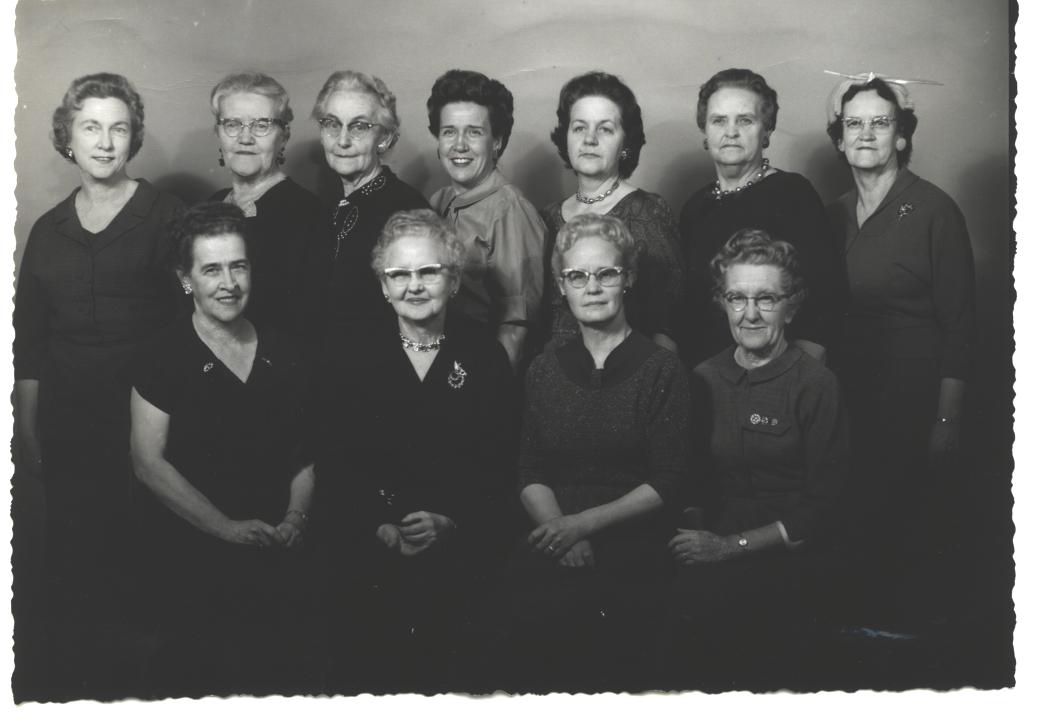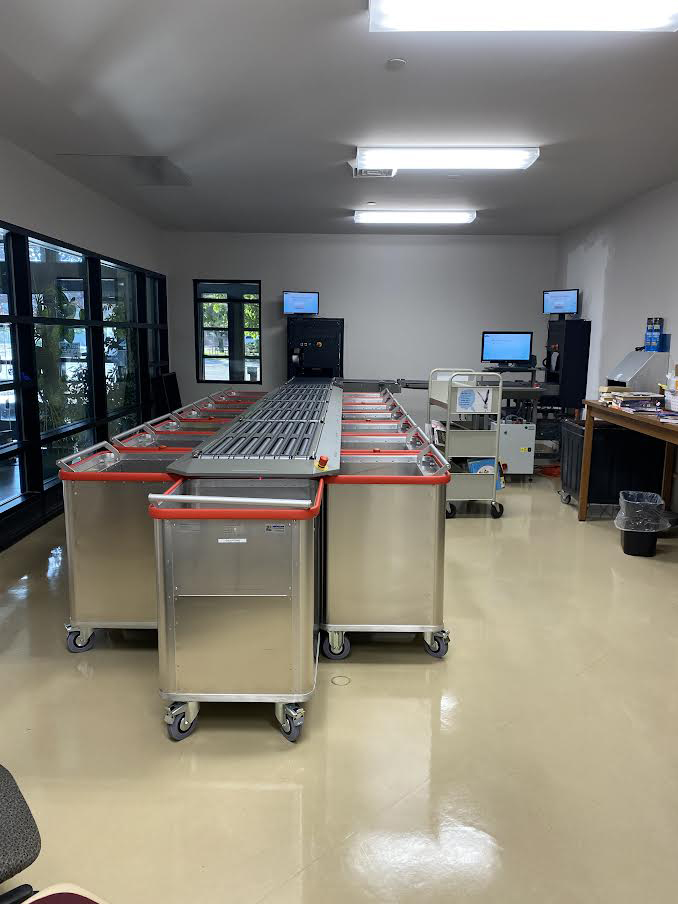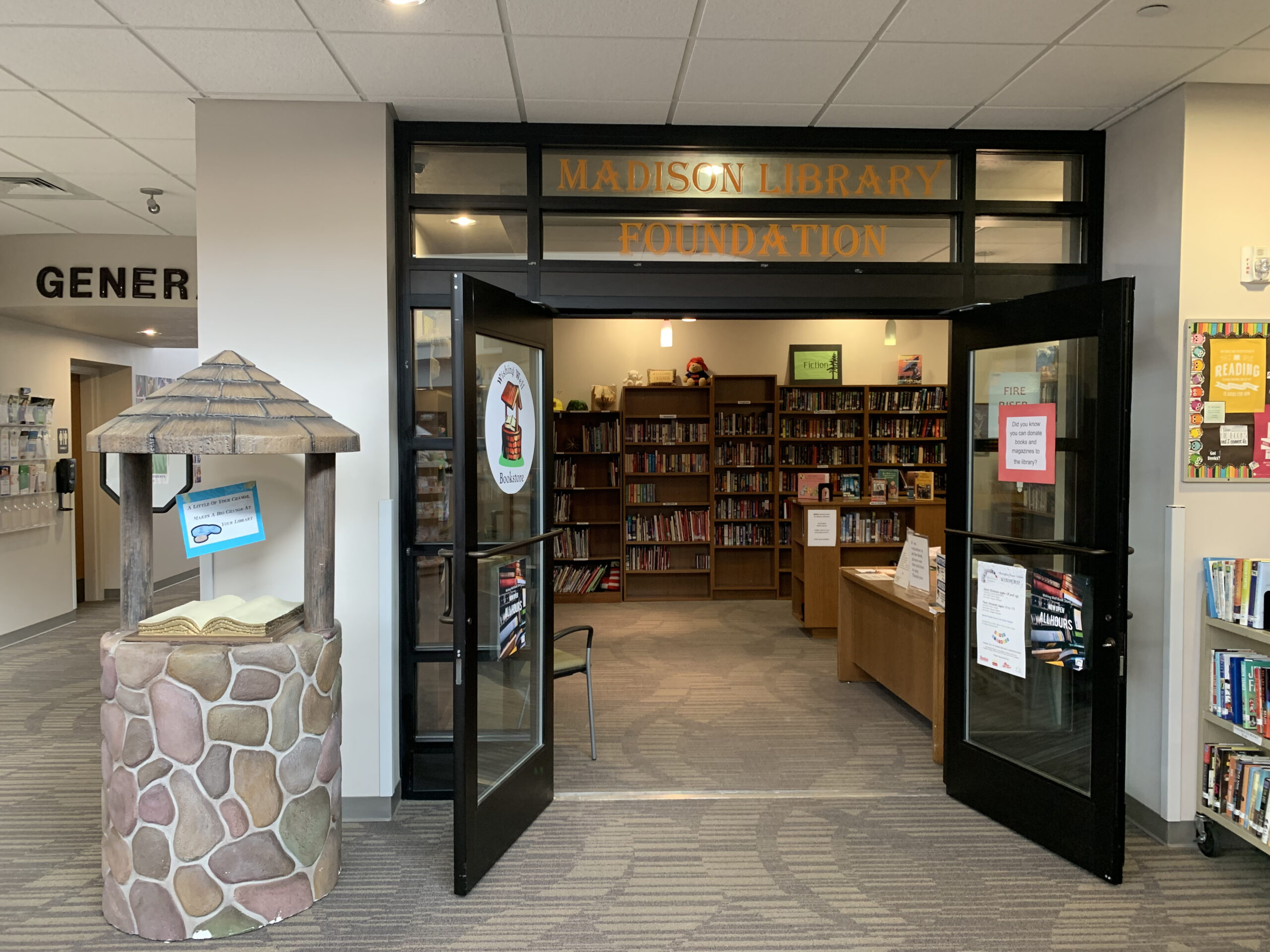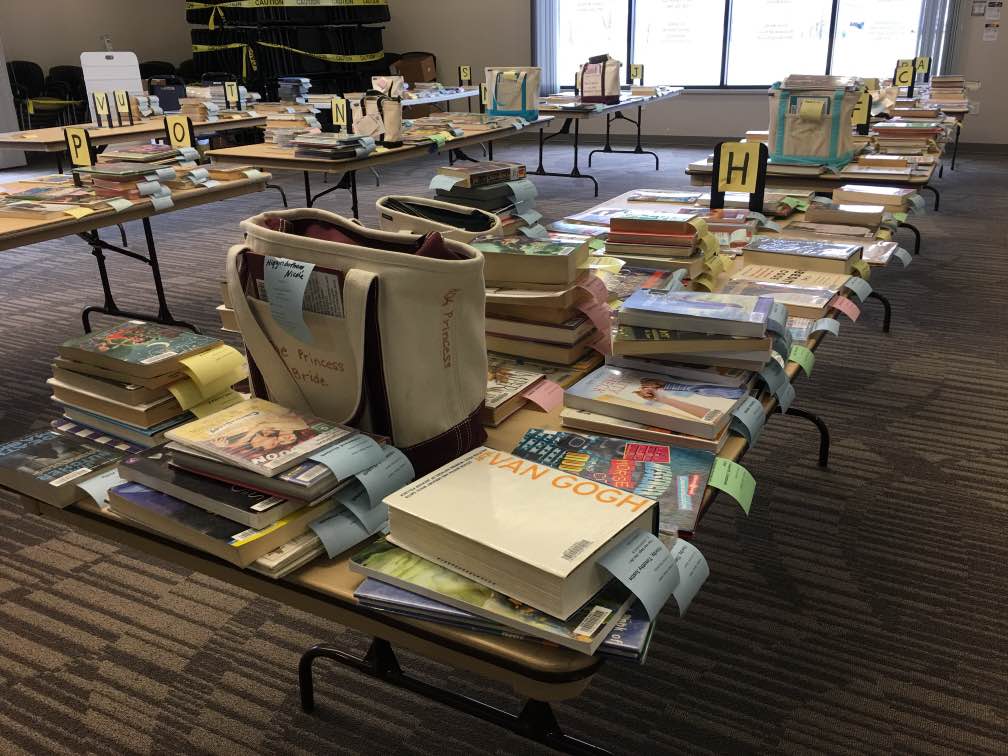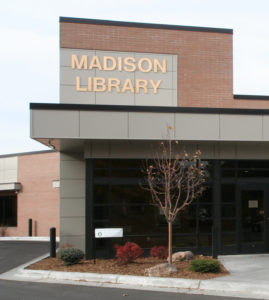Our Story Continued…
Library Opens
On December 28, 1921, the library was opened to the public with 500 books on the shelves.
The name of the Rexburg Improvement League changed to Rexburg Improvement Club and then to Rexburg Civic Improvement Club. In 1927, these ladies initiated a rummage sale which became an annual event, netting approximately $350 each year for the library.
With the growing number of books and patron use of the library, a separate building was needed. By order of the Madison County Commissioners, on September 8, 1958, the library was formed into the Madison County Free Library District, which was described as all property in Madison County except property in School District No. 322. With this new stimulus, the ladies of the Civic Club began an all-out drive to raise the funds for a library building. Local contractor and engineer Richard Davis and his father,
David Davis, donated their expertise and labor to this $35,000 project. The city of Rexburg donated a lot next to city hall on North Center Street, and the community got behind the energetic leadership of the Civic Club women.
The fund-raising was under the direction of Trustee Chairman, Lola Webster. On February 22, 1961, the new building was dedicated. In 1968, the basement of the building was remodeled to accommodate a children’s library. Little did anyone dream that in fifteen short years another library building would be needed.
Teton Dam Flood
With the collapse of the Teton Dam on June 5, 1976, the flood waters so badly damaged the library building that it had to be demolished. The furniture and most of the collection were also destroyed. The Federal Disaster Assistance Administration sent crews to survey the damage, and together with Mrs. Geraldine Jacobs, Librarian, and Gale D. Reeser, Ricks College Librarian, costs of the building, furniture, and collection were estimated. FDAA agreed to replace everything lost in the flood.
A 12,000 square foot building with basement storage was designed and built at a cost of $405,667. Besides government reimbursement, grants were obtained from the State Library and the Economic Development Administration. A new site was obtained across the street on North Center for the building.
Within two weeks of the flood, a temporary library was set up in the Ricks College Library and an upstairs room turned over to the staff for ordering and cataloging new materials. In September, the staff moved into temporary quarters in the remodeled City Hall. Over 35,000 books were sent in trucks from Utah, which proved to be a gigantic task of sorting for those suitable for library use. The others were given away to families who had lost their collections in the flood.
The new library on the corner of North Center and First North was dedicated on July 27, 1978. The new community meeting room was named the Lola M. Webster Room in recognition of her many years of long service on the library board.
In 1983, the library joined with the Idaho Falls and Pocatello Public Libraries to obtain cataloging and circulation software for the use of computers in the library. In 1991, public access terminals were added for patron use, making the card catalog obsolete. A Bill and Melinda Gates Foundation grant bought five computers for public internet access in 2000.
Also in 2000, it was determined the collection had outgrown the allotted space, and the Webster Room was remodeled to house the children’s section. This meant the library no longer had a meeting room for public use.
The library was again the recipient of funding in 2005 courtesy of the Gates Foundation, replacing four aging public computers. And in May of 2006 the Madison Library District became the first library in Southeastern Idaho to install a radio frequency identification (RFID) system, including a self-checkout station for patron use. Public response was immediate and very positive. Another Gates Foundation grant in 2007 added five more public internet computers, bringing the total to 13. In November 2007 the Madison Library installed its own computer software, Horizon from SirsiDynix, to manage cataloging and circulation of the collection.
Beginning at the turn of the 21st century, discussion began in earnest regarding the need for a larger library to serve the ever growing population of the district. Several sites were investigated but none seemed suitable. Late in 2007, it was determined the Idaho Code would not permit the district to bond for enough to build a new building.
At a special meeting of the board of trustees on January 2, 2008, it was the unanimous decision of the board to proceed with a bond election to expand and remodel the current library building. Architects, bond counsel, and bond financial advisors were hired. During preparation for the bond election, it was discovered the official name of the library district had not been changed from the Madison Country Free Library District, so a legal name change to that of the Madison Library District was effected.
Bateman-Hall won the bid to be the contractors, and construction began in September of 2009 after the Library purchased and cleared the land adjacent to the west parking lot. The new addition was completed first, allowing the children’s and young adult collections to be placed in their new homes in May 2010. After the addition was finished, the old building was heavily renovated, requiring all other collections to be housed in the Library’s new Community Room. As part of its expansion, the Library installed the most state-of-the-art book-sorting machine from 3M. The new Library officially opened its doors to a completed space on November 8, 2010.
Automation
With the installation of the new Automated Materials Handler (AMH) in May 2010, the Library was on the cutting edge of technology. The AMH was manufactured by and purchased from 3M in Minnesota. It was the 3rd machine operating in the field at the time and was the first machine of its size and type installed west of the Mississippi. The AMH utilized the RFID system that had been put in place in 2006. When items are returned the tag is read/scanned by the computer, and the item is sorted and sent into its proper bin. The speed of this sorting and constant stream of items being returned called to mind the 1952 chocolate factory episode of I Love Lucy and the machine was affectionately dubbed Lucy by Library staff.
As the population expanded, so did the number of people using the Library. The number of items being used grew as well, peaking at almost 600,000 in the mid 2010’s, which was almost triple the number of items circulated prior to the building’s expansion. This increase in the circulation of items would have been extremely difficult for a small staff to handle had the Library not had Lucy in operation.
Due to the love and attention of the employees, Lucy was the longest running AMH machine in operation in the country for several years. After more than twelve years in continuous operation, Lucy was decommissioned in August of 2022 as the necessary replacement parts were no longer being manufactured.
The replacement AMH allows for further sorting of materials and will be a vital part of Library services for years to come.
More Than Just Books
Since its physical expansion, the Library has continued to grow alongside its ever increasing population by expanding the breadth and scope of offered services and materials, including access to an increased number of audiobooks, movies, and electronic formats for a large number of titles along with print materials. The Library has joined the Idaho Digital Consortium, gaining access to tens of thousands of eBooks and eAudiobooks. That partnership has continued to evolve and has become the largest consortium for Overdrive in the world. Madison Library District patrons far outpace other consortium members in their usage of digital materials through Overdrive, demonstrating how vital this access is in the community.
With the new addition to the building, a permanent space was dedicated for the Foundation Wishing Well BookStore. This was a huge change for Foundation members as this meant that volunteers no longer had to bring boxes of heavy books up and down the stairs twice a year for a used book sale and books were available throughout the year for purchase by Library visitors. The increase in funding through the Foundation has purchased new children’s computers and paid for additional programming for all ages.
With the added Community Room space, the ability to offer additional Library programming became a large focus. While historically Library programs had been limited to just children’s preschool storytime, a monthly teen activity, and an adult book club, they have since expanded to include a variety of teen and adult programs, along with additional children’s programs. By the beginning of 2020, the Library was offering more than 4 times the number of programs that had been available in 2010. The additional programs included baby and toddler focused story times, kid (6-8 year-olds) and tween (9-13 year-olds) STEAM and craft activities, a teen Dungeons and Dragons group, tween and teen book clubs, a teen advisory council, and teen and adult creative writing clubs. On average, between 900 and 1,000 people have attended in-person programs at the Library each month. In addition to regularly scheduled monthly programs, approximately 3,500 people participate in the annual Summer Reading program each year. Other special programs include a collaborative partnership with other libraries across the country for teen programming, allowing for positive interactions between our local teens and those who share the same interests in other areas.
Coronavirus
The world-wide outbreak of Covid-19 led to an unprecedented time in 2020 for the Library. In March, and at the direction of the Governor, the physical facility was closed to the public. Once that directive was lifted, standard practices and services were required to evolve in order to provide access to materials and information in a safe manner. In May, curbside pickup of items was initiated and Library staff spent hours collecting and processing hundreds of items a day for patrons to pick up.
The Library was reopened to the public with limited hours in June, but the early months of fall saw another spike in Covid cases, resulting in some of the worst months of the pandemic. The building was once again closed to the public in October as Rexburg became a national hotspot of Coronavirus cases. Curbside services were resumed, and the Library remained closed to the public until the local health department felt the risk level had returned to a safer level in March 2021. At that time, limited service hours were used, increasing slowly through April and May. Full service hours were returned to normal in June.
Throughout 2020 and much of 2021, all in-person Library programs were canceled. These programs were conducted virtually, with storytime broadcast live online, and hundreds of Take and Go kits were made each week for children to complete activities at home. Library book clubs for adults and children were held via Zoom meeting to allow for attendee discussion. By the end of 2021, Library staff were extremely happy to return to limited in-person programs.
Cheryl Reeser, Director, March 2, 1992
Revised and Amended by Judith M. Dewey, Director, August 8, 2008
and Valerie Vail, Director, November 20, 2022
See What We Did to Celebrate During our Centennial Year!
Regular Hours of Operation
- Monday: 9:00 am – 6:00 pm
- Tuesday - Wednesday: 9:00 am – 8:00 pm
- Thursday: 11:00 am – 8:00 pm
- Friday: 10:00 am – 6:00 pm
- Saturday: 10:00 am – 2:00 pm
- Sunday: CLOSED
Closures in 2025
- January 1 – New Year’s Day
- January 20 – Martin Luther King, Jr., Day
- February 17 – Presidents Day
- March 28 – Staff Development Day
- April 5 – Building Maintenance
- May 24-26 – Memorial Day
- June 19 – Juneteenth
- July 4-5 – Independence Day
- August 30-September 1 – Labor Day
- September 12 – Staff Development Day
- October 4 – Building Maintenance
- November 11 – Veterans Day
- November 26 – Closing at 5:00 pm
- November 27-29 – Thanksgiving
- December 24-27 – Christmas
- December 31 – New Year’s Eve
- January 1, 2026 – New Year’s Day
Closures in 2026
- January 1 – New Year’s Day
- January 19 – Martin Luther King, Jr., Day
- February 16 – Presidents Day
- April 4 – Building Maintenance
- May 23-25 – Memorial Day
- June 19 – Juneteenth
- July 3-4 – Independence Day
- September 5-7 – Labor Day
- October 3 – Building Maintenance
- November 11 – Veterans Day
- November 25 – Closing at 5:00 pm
- November 26-28 – Thanksgiving
- December 24-26 – Christmas
- December 31 – New Year’s Eve
- January 1, 2027 – New Year’s Day
Address
73 North Center
Rexburg, Idaho 83440
We are located on Center Street, just north of Main Street, by the Historic Rexburg Tabernacle.
Contact Us
(208) 356-3461
24 Hour Phone Renewal: (208) 356-6658
askmadisonlibrary@madisonlib.org

